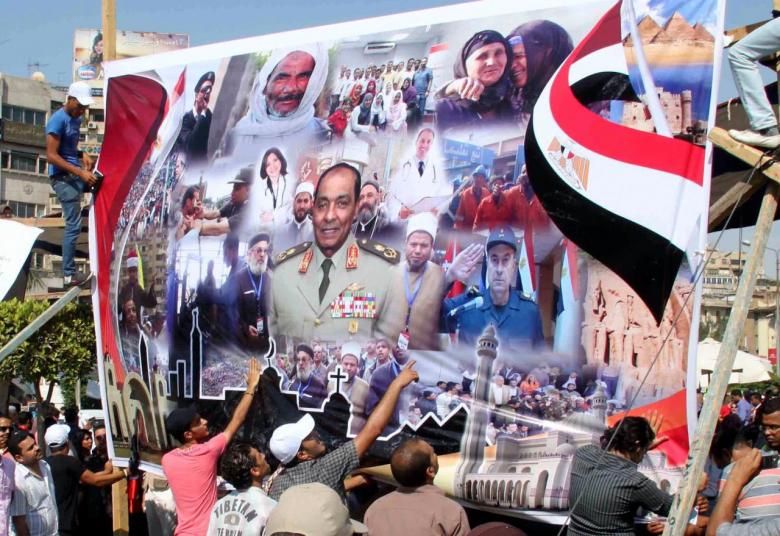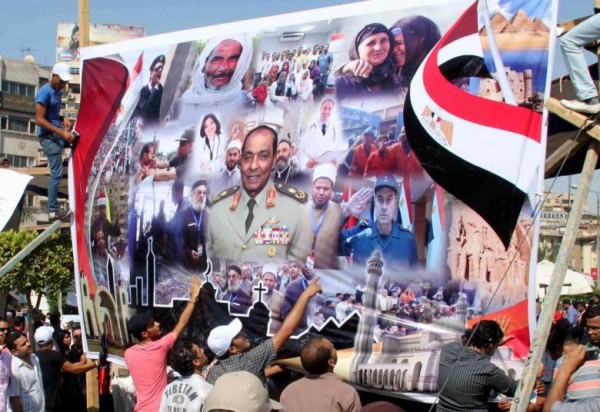
CAIRO // Egypt’s military-controlled government is being squeezed from both sides of the political spectrum just two weeks before voters go to the polls for the first time since February’s uprising.
The outcry against the Supreme Council of the Armed Forces (Scaf) came after the November 1 release of a draft of constitutional principle. This would include preventing the parliament from overseeing the military’s budget and guaranteeing it semi-autonomy.
The document confirmed fears the military was reluctant to cede power to a civilian government after taking control of the country after the resignation of the president, Hosni Mubarak, in February.
A bloc of mainly Islamist political parties, called the Democratic Alliance, was leading the attack.
The groups, including the Freedom and Justice Party, which is backed by the Muslim Brotherhood, gave the Scaf until tomorrow to back down from the proposal.
If not, there were plans for a mass protest in Tahrir Square against the military on Friday.
Elections for the lower house of parliament begin on November 28.
“The real test for Egypt, more so than anything else, will be the showdown between the military and the Islamist forces,” said Ramy Yaccoub, a political strategist involved in Cairo. “When a group of Islamist forces imposes a deadline on the military, they mean business.”
Meanwhile, liberal protests were held on Sunday against the detention of two prominent bloggers, Alaa Abdel-Fattah and Maikel Nabil Sanad, who were detained by order of the military courts. About 12,000 Egyptians have faced military trials this year, a bone of contention between activists and the interim government.
The human rights office of the UN has called on the Scaf to release all prisoners jailed for what some say were expressions of free speech. A former military official said yesterday that the Scaf was facing unprecedented pressure to make concessions.
“This problem came at the right time,” said a retired air force major general, Mohamed Kadry Said, a military analyst at the state-funded Al Ahram Centre for Political and Strategic Studies in Cairo.
“The military has been adopting a strategy to start from the highest position, asking for the most it can get,” he said. “But, facing pressure, they will go down to some middle point” in the coming weeks.
A military court ordered on Sunday that Mr Abdel-Fattah be kept in custody for another 15 days after his initial 15-day detention, which began on October 30.
Military prosecutors allege he played a role in inciting October’s sectarian clashes that left 27 people dead, mostly Coptic Christians.
A statement on Sunday from the military said Mr Abdel-Fattah was accused of stealing a military weapon, destroying military property and attacking security forces.
Mr Abdel-Fattah has denied the allegations but has refused to speak to military prosecutors because of his belief that he should not be tried in a military court.
His case has become symbolic of the military trials because of the perceived similarities to his previous arrest by the Mubarak regime in 2006.
He has published blog posts through his wife, a fellow activist, describing his experiences in jail.
On Monday, he described spending Eid in his cell with his family only able to visit him and other detainees briefly “in the presence of a number of informants – twice the number of parents”.
In a previous post on the couple’s shared blog, www.manalaa.net, he wrote of his shame at asking to be taken to a different prison facility.
“I could not take the difficult circumstances of the appeal detention, the darkness, the filth, the cockroaches that crawl over my body day and night, there is no break and we don’t see the sun, darkness again,” he wrote. “I didn’t know how to man up and take [the conditions], even though thousands are bearing such conditions and worse, even though I haven’t experienced the agonies of a military jail and wasn’t tortured like other colleagues of military trials.”
Mr Sanad was arrested on March 28 and jailed for three years for spreading false information about Egypt’s military on his blog.
An appeal hearing was adjourned on Sunday until November 27 after Mr Sanad, who is also reportedly on a hunger strike and has been placed in a psychiatric institution by the military, refused to attend.




